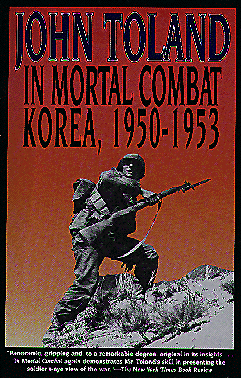GOLDSEA | ASIAN BOOKVIEW | NONFICTION
In Mortal Combatby John Toland
William Morrow, New York, 1991, 624pp, $14 (paperback)
A thoroughly engaging military history of the Korean War based on firsthand accounts of American and Korean fighting men.. Highly recommended.
EXCERPT
 n the murky night of June 24, 1950, Soviet 122-mm howitzers, 76-mm
guns, and self-propelled guns were already emplaced along the 38th
parallel. One hundred fifty Russian-built T-34 tanks were cautiously moving
forward to their final attack positions along with some 90,000 combat
troops, all trained by Soviet military advisers. The Korean People's Army
was poised for its surprise invasion of the South.
n the murky night of June 24, 1950, Soviet 122-mm howitzers, 76-mm
guns, and self-propelled guns were already emplaced along the 38th
parallel. One hundred fifty Russian-built T-34 tanks were cautiously moving
forward to their final attack positions along with some 90,000 combat
troops, all trained by Soviet military advisers. The Korean People's Army
was poised for its surprise invasion of the South.
On the other side of the 38th parallel, four understrength Republic of Korea
divisions and one regiment were on the front lines. For months there had
been warnings of a major invasion. But rumors and alarms had come so
often that most of those up front imagined this was going to be another
uneventful night. Enlisted ROK soldiers from farming villages had recently
been given fifteen-day leaves to help their families with the crops. Already
outnumbered, the ROK front line that night was dangerously depleted.
The cry of "wolf" had come so often that some frontline commanders were in
Seoul celebrating the grand opening of the officers' club at ROK Army
headquarters. Also present were most of the ranking officers of the Ministry
of National Defense. It was a gala affair and later reminded some Americans
of the military parties in Honolulu on the eve of the Pearl Harbor attack.
They too had been on a Saturday night.
At the officers' club, many Americans were present, including the American
ambassador, John J. Muccio. Born in Italy, he had served in Latin America
and was popular at parties where--a fifty-year-old bachelor with an eye for
the ladies--he enjoyed singing Spanish love songs. He was not large but
gave the impression of being so with a huge head atop broad shoulders. His
jet black hair had scarcely a streak of gray, and the bow tie he invariably
sported added to his dapper appearance.

He was born for the post in Seoul, according to his first secretary, Harold Noble. "The Republic of Korea was so new, it had so much to learn, it was bound to make so many mistakes, and its officials were so thin-skinned in their personal and national pride, that Muccio's relaxed calmness and sympathy were ideal. He genuinely liked Koreans and most Koreans genuinely admired, liked and respected him."
Unfortunately, the most important man in South Korea, President Rhee, was repelled by his familiarity and joviality, disparagingly referring to him in private as "that fellow Muccio", even though he was aware that the ambassador was also dedicated, efficient and intelligent.
ASIAN AIR ISSUES FORUM |
CONTACT US
© 1999-2003 GoldSea
No part of the contents of this site may be reproduced without prior written permission.
